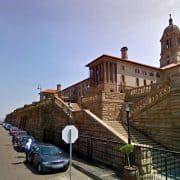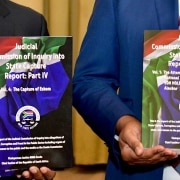|
Getting your Trinity Audio player ready...
|
Several state capture-related cases will either continue in the country’s courts or start in earnest this year. Some of those who were implicated in the Zondo commission’s report released in 2022 will continue to face the music with the hope of proving their innocence. Former chief justice Raymond Zondo made over 200 recommendations in his report, a number of these being for the criminal investigation and ultimate prosecution of those he found may have participated in state capture
While some of these cases have seen progress, others have been scuppered at the critical stage of prosecution, drawing public and political scrutiny for the National Prosecuting Authority (NPA) and its capacity. This while its newest unit, the Investigating Directorate Against Corruption (IDAC), was becoming a full legal entity with legislative powers. Formerly known as the Independent Directorate, it was first established in 2019 to address complex corruption cases that arose out of the Zondo commission’s investigations. With an initial lifespan of two years, it was meant to bolster such cases to give the NPA the necessary advantage in dealing with them.
IDAC’s establishment has gone some way towards boosting public confidence in the criminal justice system’s efforts to punish corruption, but not without some hiccups. From the delayed extradition of the Gupta brothers from the UAE to the failure of one of the cases for which their return to South Africa would have resulted in prosecution, there are now more questions than answers as to whether we will see a successful prosecution in a state capture case any time soon.
Appoint experienced judges to corruption cases, says Batohi
National Director of Public Prosecutions Shamila Batohi directed a public appeal late last year to the judiciary to be vigilant in the allocation of cases to judges for corruption cases, as these are complex and require more scrutiny.
“I would urge judges president, who make the allocations for judges to sit on particular cases, that when these allocations are made, they take into account that these are very complex, highly specialised areas, that judges with the necessary expertise and skills are allocated to deal with these matters,” she said at the time.
The NPA has come under fire for missteps in some of the cases it has enrolled, including the Nulane fraud and corruption case which saw the acquittal of several Gupta associates, government officials and private entities and, more recently, the corruption and money laundering case against former cabinet minister Zizi Kodwa and former EOH executive Jehan Mackay.
Both cases involve alleged procurement irregularity and contravention of anti-corruption legislation. While the NPA has expressed that reviews of the cases are underway in an endeavour to re-install them, there are a few that remain on the court roll, for which it will have to prove culpability on the parts of the accused.
Cases currently on the court roll
The matter relating to Transnet’s locomotives project is a case in point. Several of the parastatal’s former executives face corruption charges, including member of Parliament Brian Molefe, who was CEO at the time of the project, former CFO Anoj Singh, and former COO Garry Pita, among others. Regiments Capital, the private company that was awarded an advisory tender as part of a McKinsey consortium in 2012, is also among the accused. Molefe and the others were granted bail of R50 000 each by the Palm Ridge Specialised Commercial Crimes Court in August last year.
In terms of locomotives procurement process, Transnet paid around R54-million. Soon after its conclusion in 2015, Molefe and Singh moved to Eskom to take up the same positions they had held at Transnet. Zondo found that of all the state entities alleged to have been irregularly drained of public funds during the state capture project, Transnet was the worst off, accounting for about 80% of the true cost of state capture, which was placed in the region of R50-billion.
Another prominent case is that of former executives of facilities company Bosasa – which later traded as Africa Global Operations – that held lucrative contracts with the Department of Correctional Services for over a decade from 2004 to around 2018, amassing around R1.8-billion in the process.
The details of these contracts and their alleged irregularities were brought before Zondo by its former COO Angelo Agrizzi in early 2019. Because his evidence was self-implicating, he is among those charged with corruption and money laundering, along with other former Bosasa executives as well as several current and former senior government officials.
Besides the procurement irregularities, the Bosasa evidence also revealed a series of inappropriate connections to high-profile personalities, including politicians previously and currently serving in the state in different capacities, from Cabinet to Parliament and the judiciary.
One active case related to Bosasa is that of former ANC MP Vincent Smith, who was implicated in accepting bribes from the company while he chaired the portfolio committee on correctional services. He allegedly received favours including security upgrades to his home in Gauteng, as well as cash transferred into his personal bank account via the bank account of his company, Euroblitz.
Smith, who is expected to return to court in April this year, is facing charges of fraud and contravening the Prevention and Combating of Corrupt Activities Act.
Another case is that of Trevor Mathenjwa, a director of Bosasa subsidiary Sondolo IT, who is accused of corruption to the tune of R300 000. The Johannesburg High Court postponed the matter to 7 February for pre-trial proceedings. According to the IDAC, the amount was allegedly offered and received as gratification from Bosasa and Sondolo IT to the late Dudu Myeni for the upgrade of the security systems to her home.







